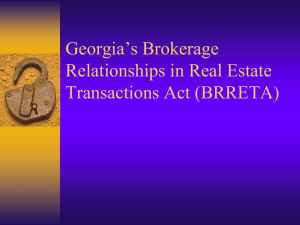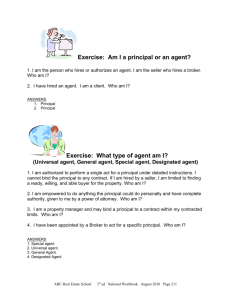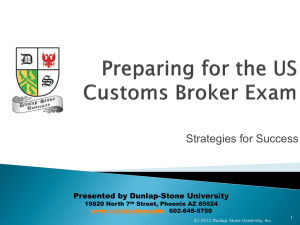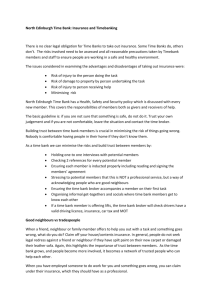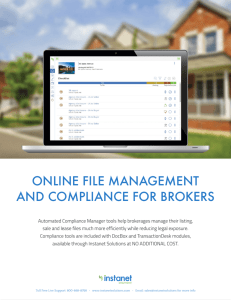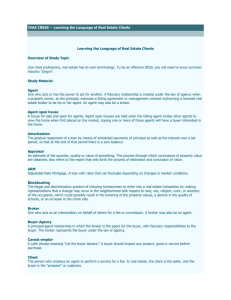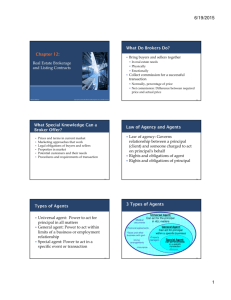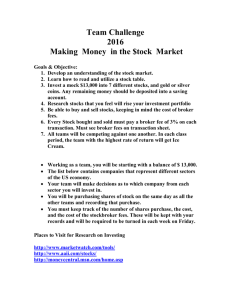LICENSE LAW TEST QUESTIONS - Tucker School of Real Estate
advertisement
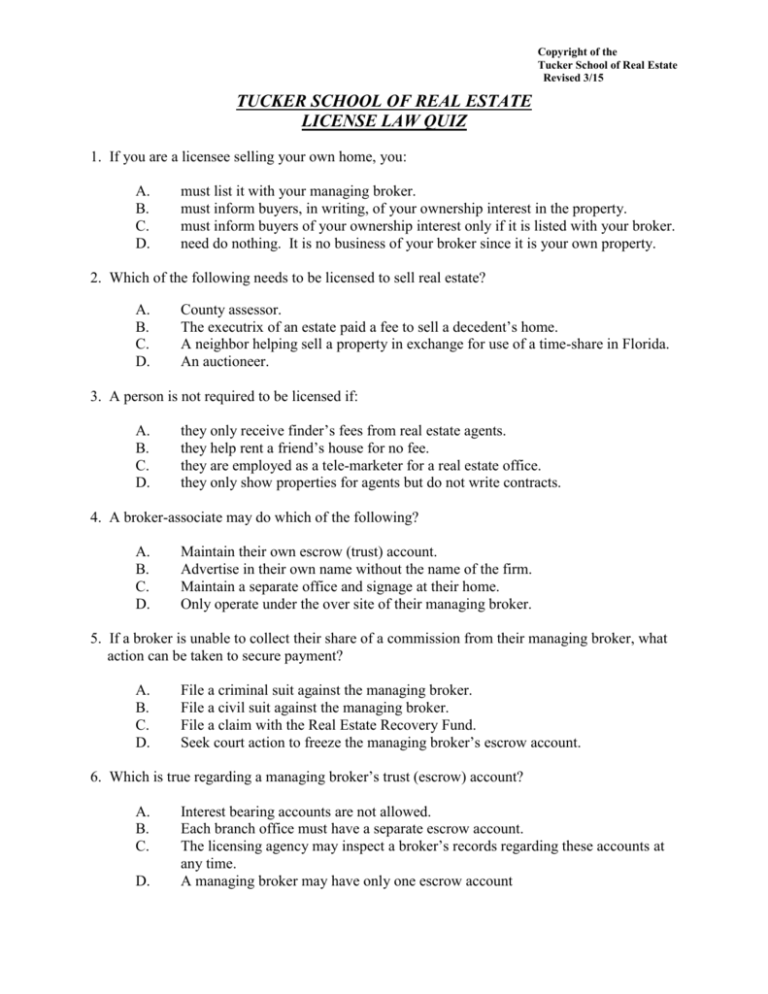
Copyright of the Tucker School of Real Estate Revised 3/15 TUCKER SCHOOL OF REAL ESTATE LICENSE LAW QUIZ 1. If you are a licensee selling your own home, you: A. B. C. D. must list it with your managing broker. must inform buyers, in writing, of your ownership interest in the property. must inform buyers of your ownership interest only if it is listed with your broker. need do nothing. It is no business of your broker since it is your own property. 2. Which of the following needs to be licensed to sell real estate? A. B. C. D. County assessor. The executrix of an estate paid a fee to sell a decedent’s home. A neighbor helping sell a property in exchange for use of a time-share in Florida. An auctioneer. 3. A person is not required to be licensed if: A. B. C. D. they only receive finder’s fees from real estate agents. they help rent a friend’s house for no fee. they are employed as a tele-marketer for a real estate office. they only show properties for agents but do not write contracts. 4. A broker-associate may do which of the following? A. B. C. D. Maintain their own escrow (trust) account. Advertise in their own name without the name of the firm. Maintain a separate office and signage at their home. Only operate under the over site of their managing broker. 5. If a broker is unable to collect their share of a commission from their managing broker, what action can be taken to secure payment? A. B. C. D. File a criminal suit against the managing broker. File a civil suit against the managing broker. File a claim with the Real Estate Recovery Fund. Seek court action to freeze the managing broker’s escrow account. 6. Which is true regarding a managing broker’s trust (escrow) account? A. B. C. D. Interest bearing accounts are not allowed. Each branch office must have a separate escrow account. The licensing agency may inspect a broker’s records regarding these accounts at any time. A managing broker may have only one escrow account Copyright of the Tucker School of Real Estate Revised 3/15 7. The selling agent must do which of the following? A. B. C. D. Disclose to the seller that the buyer would consider a counter-offer. Verify the financial ability of the buyer to obtain a mortgage loan. Disclose to the buyer, why the sellers are selling, if the agent has such knowledge. Obey all instructions of the buyer client, regardless of their legality. 8. An unlicensed staff member in a real estate office may do which of the following? A. B. C. D. List property on behalf of the employing licensee. Negotiate commissions with sellers. Give the list price and directions to listed properties. Hold open houses for the managing broker only. 9. As an inducement to obtain business, a broker may offer? A. B. C. D. A rebate to a buyer with the buyer’s written approval. To pay the seller’s closing costs with a disclosure signed by the seller. A kickback to the buyer with full written disclosure. A rebate to anyone, if disclosed in writing to all parties. 10. A licensee can lose his or her license for which of the following? A. B. C. D. Allowing funds to be deposited into an interest-bearing escrow account. Paying a commission to an unlicensed person. Acting as a disclosed limited agent in a real estate transaction. Charging a commission rate higher than the Real Estate Commission allows. 11. In order to make a claim against the Real Estate Recovery Fund, one must: A. B. C. D. choose to go directly to the Real Estate Commission, as opposed to filing suit, with the claim. file their claim within two years of the event that caused a monetary loss due to dishonest dealings by an Indiana licensee. file suit in a court of law, obtain a judgment, and exhaust all legal remedies. have a monetary loss, including attorneys’ fees, in excess of $20,000. 12. The Seller’s Residential Real Estate Disclosure form: A. B. C. D. must be completed by the listing agent or seller. must be furnished to the purchaser prior to closing the transaction. warrants the physical condition of the property at the time of closing. must be furnished to, and signed by, the purchaser prior to acceptance of an offer. Copyright of the Tucker School of Real Estate Revised 3/15 13. Under license law, the Managing Broker: A. B. C. D. is responsible for their actions and those of all brokers associated with him/her. is not responsible for the actions of their licensees if they maintain errors and omissions insurance. is responsible for their actions only, with Broker Associates individually liable. must employ independent contractors only. 14. To become a Managing Broker, an applicant must : A. B. C. D. have been licensed under a Managing Broker in any status for the previous 24 months. have been licensed under a Managing Broker in any status for the previous 12 months. have been licensed for the previous 24 months and complete a Managing Broker course. have been licensed under a Managing Broker in active status for the previous 24 months and complete a Managing Broker course. 15. When a sole proprietor Managing Broker dies, the affiliated licensees: A. B. C. D. would have 180 days to transfer their license to a new employing broker. have 90 days to complete business that is already contracted for. may continue practicing for no more than 90 days. have 90 days to complete current listings, but take on no new business 16. If a property is deemed to be “psychologically affected”, the listing agent: A. B. C. D. must disclose this fact and the nature of the affectation to all parties. must disclose this fact to prospective buyers. may not intentionally misrepresent a fact in response to a direct question. has no obligation one way or the other because psychological affectations are not considered to be physical defects. 17. A person would be required to have a Managing Broker’s license to perform which of the following acts? A. B. C. D. Prepare a competitive market analysis. Negotiate loans. Sue a seller that refuses to pay an earned fee. Complete an offer to purchase contract for a buyer. Copyright of the Tucker School of Real Estate Revised 3/15 18. When a Broker changes firms, which of the following is true? A. B. C. D. A transfer application must be completed. The Broker’s listings are automatically transferred to the new firm The Real Estate Commission appoints a trustee to oversee the transfer of listings. The original Managing Broker sends the license directly to the new Managing Broker. 19. When acting as a limited agent, a licensee has certain limitations as to how they should . conduct themselves. Which of the following would be a violation of those limitations? A. B. C. D. . Giving the buyers information about other homes that have sold in the area. Refusing to tell the buyer why the seller is selling. Failing to tell the seller that the buyer would probably pay more than they have offered. Telling the buyer that, in your opinion, the property is overpriced, and the seller would probably take less. 20. Which of the following is not true about listing contracts in the State of Indiana? A. B. C. D. They must be prepared in duplicate. They must show a definite expiration date. They must not be for a term of more than 12 months. They must be signed by all property owners and the broker. 21. In the State of Indiana, net listings: A. B. C. D. are not legal. require the written consent of all parties. must state the maximum fee. must not allow the broker to net more than the seller. 22. Which of the following is true regarding partnership licenses in Indiana? A. B. C. D. At least one of the partners must be a licensed broker. The partnership license fee is $25.00. All partners must be licensed brokers. Partnership licenses must be renewed annually. 23. The lessor fails to provide the Residential Sales Disclosure Form to a tenant who has just entered into a 2 year residential lease with the landlord. Should the landlord refuse to provide one, what does this do to the status of the lease agreement? A. B. C. D. The lease becomes void. The lease becomes voidable by the lessee. The lease is unenforceable against the lessee. The lease is unaffected. Copyright of the Tucker School of Real Estate Revised 3/15 24. The Indiana Real Estate Commission is comprised of: A. B. C. D. twelve district members and two at-large members. nine district members and three at-large/consumer members. twelve elected members. nine appointed district members and three elected at-large/consumer members. 25. The Chairman of the Real Estate Commission is: A. B. C. D. appointed by the Governor. appointed by the Executive Director. elected in the general election. elected by the Commission members. 26. ) For active status licensees to be eligible for renewal, which of the following is true regarding Continuing Education (CE)? A. B. C. D. Must complete 12 hours of CE annually. Must complete 16 hours of CE annually. Must complete 12 hours of CE each license year. Must complete 36 hours of CE every three years. 27. Under IN License Law, who is required to maintain trust (escrow) accounts? A. B. C. D. All brokers. Listing brokers. Managing brokers. Managing brokers and licensees who incorporate . 28. What action should be taken by a listing broker with earnest money received in connection with a real estate transaction? A. B. C. D. Deposit the money as soon as it is received in the broker’s trust account. Deposit the money in the broker’s trust account within 48 hours after authorization from the buyer. Deposit the money in the managing broker’s escrow account within 2 banking days after acceptance of the offer. Deposit the money in the managing broker’s trust account within 48 hours after presentation of the offer to purchase. Copyright of the Tucker School of Real Estate Revised 3/15 29. In order to obtain a broker’s license in the State of Indiana, which of the following is true? A. B. C. D. Applicants must be at least 18 years old. Applicants must be at least 18 years old or have a high school diploma or GED. Applicants must have passed the state examination with a score of at least 70%. After successfully passing the state examination, applicants must send the necessary forms to the commission within 180 days. 30. Which of the following is true of non-resident licensees? A. B. C. D. Non-residents may only be brokers or managing brokers. For a non-resident to be licensed, they must be a managing broker. Non-resident licensees cannot be managing brokers. Indiana does not allow non-resident licenses. 31. An Indiana licensee is representing two buyers, buyer #1 has seen and is interested in 1755 Maple St., now buyer #2, wants to see the same property. The licensee: A. B. C. D. May not represent two buyers for the same property without the express written consent of both buyers. Would become a limited agent if they show the property to buyer #2. May only show the property to buyer #2 with full disclosure to buyer #1 May show the property to buyer #2 without disclosing this to buyer #1. 32. Which of the following would be a violation of license law? A. B. C. D. Offering a free home warranty to homebuyers and disclosing that to all parties to the transaction. Acting as broker and disclosed principal in a transaction. Acting as agent for both buyer and seller in the same transaction with the expressed oral consent of both. Offering part of the listing commission to cooperating brokers. 33. Which of the following would be a violation of license law? A. B. C. D. To give an opinion of value that a seller relies upon. To complete a sales contract for a purchaser. To act as a limited agent in a real estate transaction. To assure a buyer that a property will go up in value. Copyright of the Tucker School of Real Estate Revised 3/15 34. The Commission may summarily suspend a practitioner’s license, if there is a clear and immediate danger to the public’s health and safety, for a period of: A. B. C. D. they may not suspend the license without a proper hearing. not more than 90 (ninety) days. not more than 1 (one) year. not more than 120 (one hundred twenty) days. 35. Should a licensee wish to purchase property from a private owner, the licensee: A. B. C. D. is required to disclose the licensee’s true estimate of market value. must try to market the property prior to making any offer. required to disclose that they are a licensed agent. must tell the seller if the property appears underpriced. 36. The Commission, upon receipt of a court order establishing that a licensee is delinquent on child support payments: A. B. C. D. shall suspend the licensee and may fine them an amount equal to the outstanding balance. may temporarily revoke the licensee until the outstanding balance has been paid in full. may place the licensee on probation until the balance is brought current. shall take no action, as this is under the Attorney General’s jurisdiction. 37. Once a broker candidate has successfully completed the state examination, the person must submit their application for a license within what time period: A. B. C. D. there is no time limit, once the exam has been passed. within one year of passing the pre-license course and exam. within 1 year of passing the examination. once they have found a Managing Broker who will hold their license. 38. What must a nonresident license applicant file with the Commission? A. B. C. D. Certificate of specific performance. Irrevocable written consent to suit. Copy of his or her birth certificate. Corpus delicti. Copyright of the Tucker School of Real Estate Revised 3/15 39. When a licensee is convicted of a crime that has a direct bearing on the licensee’s ability to practice competently, Indiana license law allows the commission to: A. B. C. D. immediately revoke the license. require the licensee to attend a hearing on the matter. summarily suspend the license. revoke the licensee’s membership in the National Association of REALTORS. 40. Eric and Julie are brokers affiliated with XYZ Realty’s South Office, their sales/branch manager is Fran, and the Managing Broker of XYZ is David. Eric brings a buyer to one of Julie’s listings and an offer to purchase is accepted. Which of the following accurately describes this situation? A. B. C. D. This is Limited Agency for Eric, Fran and Julie, and In-House Agency for David. This is “In-House Agency” for Eric and Julie and “Limited Agency” for David This is “In-House Agency” for all. This is “Limited Agency” for all. 41. Which of the following would be an example of incompetent practice? A. B. C. D. Giving an opinion of value for listing purposes. Completing a sales contract for a purchaser. Acting as a limited agent in a real estate transaction. Assuring a buyer that a property will increase in value. 42. An individual who has passed the State licensing examination contacts an Indiana Managing Broker and explains that he has full-time employment and could not actively practice for 3-4 years when she will retire. This individual would like the Managing Broker to hold his license for the period required to qualify for a Managing Broker’s license. In this circumstance, the Managing broker should: A. B. C. D. request the Commission issue active status license, but require the individual to attend sales meetings to keep as active as possible. decline to hold the license. request the license and charge the individual a reasonable fee for holding the license. offer to associate with them, but only if the individual signs a written agreement not to apply for a Managing Broker’s license. Copyright of the Tucker School of Real Estate Revised 3/15 43. Which of the following would be true regarding Indiana limited agents and psychologically affected properties? A. B. C. D. Limited agents must disclose their knowledge of psychological affectations to all parties. Due to their limited agency position, limited agents cannot discuss psychological affectations. Licensees cannot act as limited agents when the property is psychologically affected. Limited agents, when asked, must not intentionally misrepresent the facts. 44. Indiana advertising regulations would be violated if a licensee: A. B. C. D. places an advertisement for a listed property under her Managing Broker’s name, but fails to include her own. places an ad for real property services that includes only her name, license number and phone number. places an advertisement for real property services that fails to disclose the fees associated with those services. does not place a “For Sale” sign on a listed property. 45. The type of listing agreement in Indiana that provides for the listing Managing Broker to be compensated regardless of who sells the property is a(n): A. B. C. D. Exclusive-agency listing. Exclusive-right-to-sell listing. Open listing. Closed listing. 46. All purchase agreements in Indiana: A. B. C. D. may be oral and still enforce payment of compensation. must be in writing, either paper or in electronic format. must have a definite expiration date. must be presented to the seller for formal acceptance or rejection within 24 hours of acceptance. 47. A licensee may represent and be associated with two Managing Brokers under which of the following circumstances? A. B. C. D. Under no circumstances. With the permission of the office manager. With the express written consent of the two Managing Brokers being represented. With the written consent of the Commissioner. Copyright of the Tucker School of Real Estate Revised 3/15 48. Regarding sub-agency in the State of Indiana, a brokerage firm: A. B. C. D. must disclose this through the MLS/BLC. may offer it only if the buyer and seller agree in writing. may offer it only if the fees charged to all parties are equal. may not offer it under any circumstances. 49. Agent Alice is affiliated with ABC Realty, her Managing Broker is Bill. Alice brings a buyer to a listing of her sales/branch manager Steve. Which of the following accurately describes this situation: A. B. C. D. this is simply “In-House Agency”. this is “In-House Agency” for Alice and Steve, but “Limited Agency” for Bill this is “Limited Agency” for Alice, Steve and Bill. this is “In-House Agency”, until an offer is presented, at which point it becomes “Limited Agency”. 50. Brokerage firms must provide a detailed accounting of all funds handled to clients and maintain these records: A. B. C. D. for a period of 7 years for transactions in which they acted as Listing Broker and held earnest money for another party. for a period of 5 years for transactions in which they acted as Listing Broker and held earnest money for another party. for a period of 7 years. for a period of 5 years. Copyright of the Tucker School of Real Estate Revised 3/15 ANSWER SHEET 1. B 2. C 3. B 4. D 5. B 6. C 7. C 8. C 9. C 10. B 11. C 12. D 13. A 14. D 15. B 16. C 17. C 18. A 19. D 20. C 21. C 22. C 23. D 24. B 25. D 26. 27. 28. 29. 30. 31. 32. 33. 34. 35. 36. 37. 38. 39. 40. 41. 42. 43. 44. 45. 46. 47. 48. 49. 50. C C C A C D C D B C C C B B B D B D B B B A D C D
